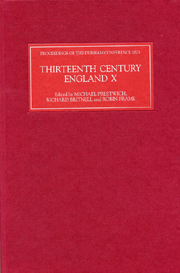Book contents
- Frontmatter
- Contents
- PREFACE
- ABBREVIATIONS
- The Meetings of Kings Henry III and Louis IX
- Counting the Cost: The Financial Implications of the Loss of Normandy
- Networks of Markets and Networks of Patronage in Thirteenth-Century England
- Three Alien Royal Stewards in Thirteenth-Century England: The Careers and Legacy of Mathias Bezill, Imbert Pugeys and Peter de Champvent
- The Eyre de terris datis, 1267–1272
- Joan, Wife of Llywelyn the Great
- Town and Crown: The Kings of England and their City of Dublin
- English Landholding in Ireland
- The Reception of the Matter of Britain in Thirteenth-Century England: A Study of Some Anglo-Norman Manuscripts of Wace's Roman de Brut
- Fearing God, Honouring the King: The Episcopate of Robert de Chaury, Bishop of Carlisle, 1258–1278
- Cloistered Women and Male Authority: Power and Authority in Yorkshire Nunneries in the Later Middle Ages
- Taxation and Settlement in Medieval Devon
- Clipstone Peel: Fortification and Politics from Bannockburn to the Treaty of Leake, 1314–1318
- Royal Patronage and Political Allegiance: The Household Knights of Edward II, 1314–1321
- ‘Edward II’ in Italy: English and Welsh Political Exiles and Fugitives in Continental Europe, 1322–1364
Networks of Markets and Networks of Patronage in Thirteenth-Century England
Published online by Cambridge University Press: 12 September 2012
- Frontmatter
- Contents
- PREFACE
- ABBREVIATIONS
- The Meetings of Kings Henry III and Louis IX
- Counting the Cost: The Financial Implications of the Loss of Normandy
- Networks of Markets and Networks of Patronage in Thirteenth-Century England
- Three Alien Royal Stewards in Thirteenth-Century England: The Careers and Legacy of Mathias Bezill, Imbert Pugeys and Peter de Champvent
- The Eyre de terris datis, 1267–1272
- Joan, Wife of Llywelyn the Great
- Town and Crown: The Kings of England and their City of Dublin
- English Landholding in Ireland
- The Reception of the Matter of Britain in Thirteenth-Century England: A Study of Some Anglo-Norman Manuscripts of Wace's Roman de Brut
- Fearing God, Honouring the King: The Episcopate of Robert de Chaury, Bishop of Carlisle, 1258–1278
- Cloistered Women and Male Authority: Power and Authority in Yorkshire Nunneries in the Later Middle Ages
- Taxation and Settlement in Medieval Devon
- Clipstone Peel: Fortification and Politics from Bannockburn to the Treaty of Leake, 1314–1318
- Royal Patronage and Political Allegiance: The Household Knights of Edward II, 1314–1321
- ‘Edward II’ in Italy: English and Welsh Political Exiles and Fugitives in Continental Europe, 1322–1364
Summary
The development of medieval markets and fairs is an issue of central significance in economic history and historical geography. The already complex marketing network in England was supplemented during the thirteenth century by a great increase in new grants. Traditional interpretations linked this development to the commercialisation of the English economy in that period and increased need for places to sell surplus and purchase supplies. More recently, historians have been taking into consideration the impact of political and institutional factors on the development of the markets and fairs network in this period. In addition, markets have been investigated as cultural and social phenomena and from the perspective of the physical space of urban and rural markets. The questions of how market days became associated with theatre spectacles, public acts of penance, and social control have been the subject of recent research. As a result, markets and fairs are not seen solely as tools of economic exchange; instead, like other social institutions, their role for those who owned them, traded there or used them is examined on many levels: social, political and cultural. The income derived from markets and fairs may have been a useful addition to other manorial rights, whilst their ownership could enhance prestige and provide better control over the neighbourhood.
It is no accident that this paper concentrates on the mid-thirteenth century. This was the period of the highest increase in grants of markets and fairs, and this growth had social and economic significance. The sheer number of grants issued at that time makes possible qualitative and quantitative exploration of several issues. First, there is the question why and how grants of markets and fairs could have been used as a patronage tool in the context of thirteenth-century England. Markets and fairs had the status of a royal franchise, and their existence was relatively strictly controlled by the beginning of the century; thus grants could easily be used for patronage purposes by the king. Secondly, the paper explores how grants of markets and fairs were used in particular political contexts, in the 1250s and again in 1267–8, immediately after the Barons’ War. Thirdly, it uses case studies of grants of markets and fairs in the mid-thirteenth century in order to consider the question why so many noblemen wanted to establish or increase the number of markets on their estates.
- Type
- Chapter
- Information
- Thirteenth Century England XProceedings of the Durham Conference, 2003, pp. 41 - 50Publisher: Boydell & BrewerPrint publication year: 2005



